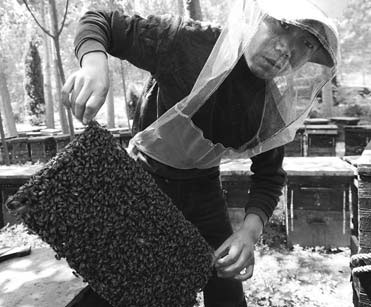Beekeeper's life a hive of activity
Updated: 2013-07-09 06:14
By Ju Chuanjiang and Zhao Ruixue in Jinan (China Daily)
|
||||||||
|
Beekeeper Chen Hao follows bees around the country to produce honey. Ju Chuanjiang / China Daily |
It's early morning but the sun is already beating down. Beekeeper Chen Hao is doing his rounds, checking on the 120 hives that house his 1.2 million workers on a patch of land nestled at the foot of Mount Taishan in Shandong province.
While Chen checks the bees, his wife Zhao Ransong is in their temporary home, a generator powered tent, extracting honey and wax.
The couple lives this way for eight months each year, following the bees around the country to produce honey.
The honey trade can generate an annual net income of 60,000 yuan ($9,700) for the couple, who are among the 300,000 beekeepers who tend to over 8.5 million colonies of bees in China that produced 448,000 tons of honey last year, according to the Agriculture Ministry. A total of $272 million honey-related products were sold overseas.
The number of bee colonies in China is expected to reach 10 million by 2015. These bees will produce 500,000 tons of honey.
Born in Wanxi village in Anhui province, Chen began his career as an apprentice to an experienced beekeeper where he worked for three years before traveling around the country alone at the age of 20.
"We travel to five or six places to find new flowers during the eight months from March to October," the 33-year-old says. "The flavor (of the honey) not only changes every season but varies by location."
In autumn, says Chen, bees favor the flowers of the linden tree in Jilin province, which gives honey a rich, sweet taste. The flowers from rape and the locust tree dominate the flavors of the spring honey.
Usually Chen selects a location within a 20 km radius of the flowers for his bees. Chen's hives are housed in wooden boxes with a hole for an entrance. Everyday, hundreds of bees pour out of the boxes and another group of bees fly in with pollen tucked under their appendages.
"Bees are sensitive to the environment. They especially hate the smell of agricultural chemicals," Chen says. "A clean environment is essential to both the quantity and quality of the honey."
Being with bees for 16 years, Chen is familiar with bee politics.
"Knowing the bee kingdom helps you to raise them better," Chen says.
"Every hive needs a queen bee. Worker bees work as servants for the queen bee," Chen explains. "The queen bee is responsible for enriching their family members. A productive queen bee can lay about 2,000 eggs in 24 hours and has an average lifespan of between three and five years."
What Chen admires most is the worker bee, whose lifespan is about 40 days, though some may live for several months in winter.
Chen spends three months a year in Shandong, owing to the province's vast variety of flowers.
"Honey made here can be sold for 16 yuan for 500 g," Chen says, smile on his tanned face.
"In addition, bees help pollinate the plants," Chen adds, explaining that beekeeping not only benefits beekeepers but the overall agricultural industry.
According to the Agriculture Ministry, the financial benefit that the bee-driven pollination provides to the agricultural industry is worth nearly 110 times what honey-related products actually make.
Chen and Zhao say the only downside to their work is the long periods away from their children.
Zhao says she is looking forward to their 8-year-old son's and 6-year-old daughter's summer break, when the children will meet them in Shandong.
Contact the writers through
zhaoruixue@chinadaily.com.cn.
(China Daily USA 07/09/2013 page10)

 Thousands flock to Texas Capitol over abortion
Thousands flock to Texas Capitol over abortion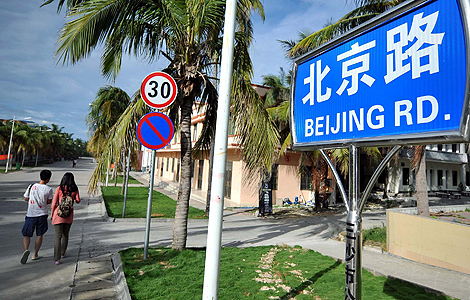
 China's youngest city glistens under palm trees
China's youngest city glistens under palm trees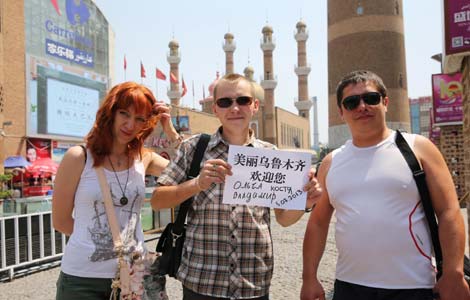
 Xinjiang tourism recovering
Xinjiang tourism recovering
 Quebec disaster death toll jumps to 13
Quebec disaster death toll jumps to 13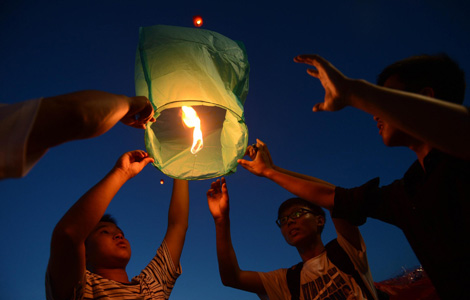
 Mourn for students in San Francisco air crash
Mourn for students in San Francisco air crash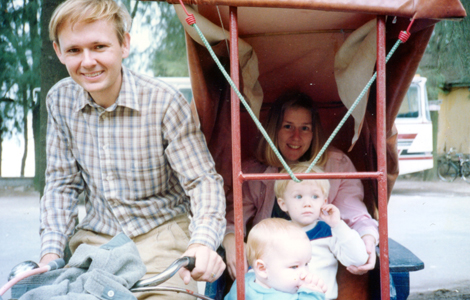
 Rolling stone finally settles
Rolling stone finally settles
 Double-decker bus caught fire in Shanghai
Double-decker bus caught fire in Shanghai
 China, Russia begin live-fire navy drill
China, Russia begin live-fire navy drill
Most Viewed
Editor's Picks

|

|

|

|

|

|
Today's Top News
China improves maritime law enforcement
Air crash victims' families arrive in SF
Hopes are high for US, China talks
Laden's life on the run revealed
US mulls hastening withdrawal from Afghanistan
China's inflation grows 2.7% in June
Country singer Randy Travis in critical condition
Police look for suspects in Brazil soccer slaying
US Weekly

|

|
